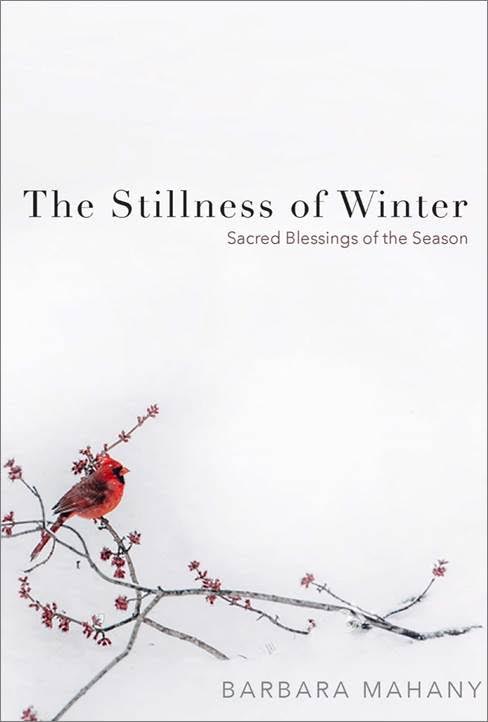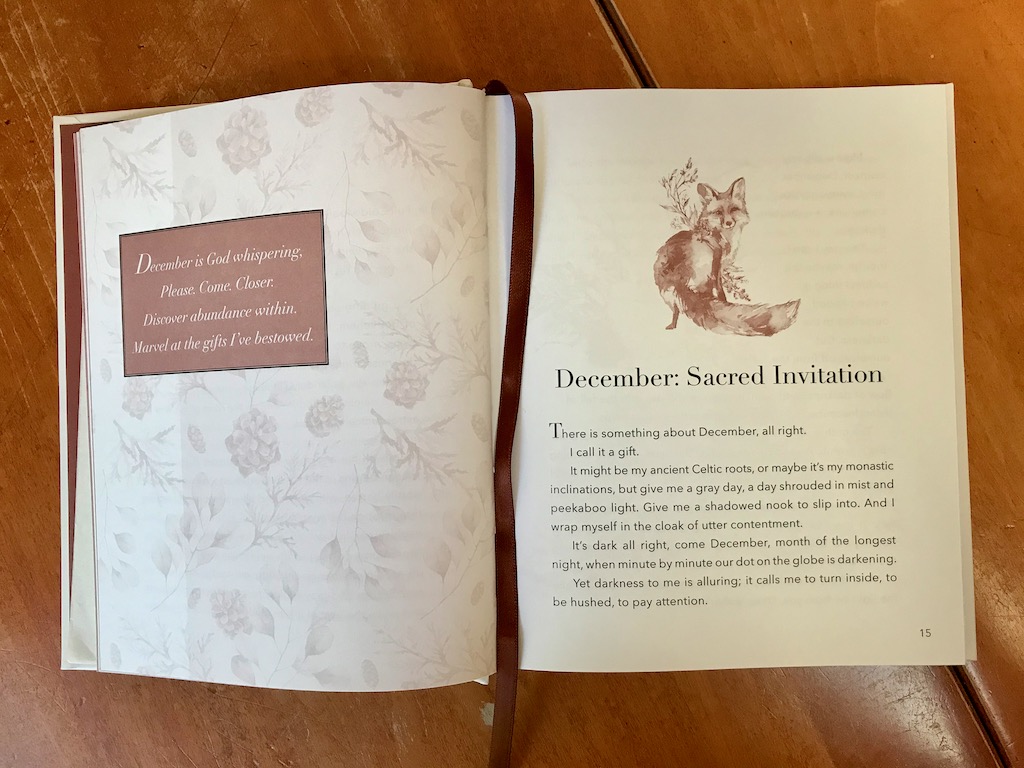of prophets and poets, and the sacred instruction: let the light be from within
by bam
maybe you read the newspaper every morning. maybe you even read the Chicago Tribune, the newspaper that birthed most of the most precious threads in my life. but chances are — reading the studies that come, one after a sad other, from the journalism think tanks — you don’t. the sound of the rolled-up sausage of a newspaper landing with a thwop on the front stoop is nearly obsolete. but this week, my old newspaper made room for a little essay i wrote, one birthed in the pages of Stillness, that beribboned little book that seems to be winging its way to armchairs and reading nooks in various vicinities around the countryside this december.
given the unlikelihood that you would have stumbled across this little essay — a variation on the opening essay, “December: Sacred Invitation,” in Stillness — and given that my little laptop has a crack-of-dawn doctor’s appointment at the genius bar, i figured i’d give the essay a whirl here. it comes with the hope that you find all sorts of ways to fill the december darkness with flickering flames, and tongues of fire that leap from the hearth. the ones in your home, or the ones in your heart.
Commentary: In December’s darkness, the prophets and poets guide us toward the light
By BARBARA MAHANY
December’s darkness is coming like never before.
Oh, sure, as the sun arcs into its wintry descent, as the night grows to its longest, and day after day a minute is shaved at the dawn and at dusk, the sunlight ebbs and the shadow grows. There’s that darkness.
But cloaking all of it this year is the darkness of knowing we can’t kindle the light in gathering kinship.
We will be more alone this winter, perhaps, than ever before.
But there is a bright side, or at least a blessed side.
I say, celebrate the darkness — landscape of discovery, of finding our way only by engaging, igniting, heightening our deeper senses, the senses of the heart and the soul, intellect and imagination.
Celebrate the quietude. The stillness that comes in the hours of solitude, that state of grace sought by the ancient mystics and saints, by Zen priests and the Desert Elders of Egypt, by Hildegard of Bingen and Henry David Thoreau, deep in the woods of Walden Pond, the ones who dialed down the noise and distraction, pressing their ears into the silence, awaiting the murmurings of the still small voice. As Meister Eckhart put it: “There is nothing so much like God as silence.”
The truth is: Stillness and darkness draw out our deep-down depths. Darkness is womb, is seed underground. Darkness is where birthing begins, incubator of unseen stirring, essential and fundamental growing.
Stillness, as all the enlightened have known, in the paradox that might be a Buddhist koan, is the fullness that comes only through emptiness.
This December, both will abound. We’d be wise to welcome them.
December, I like to think, is when God cloaks the world — or at least the northern half of the globe — in what amounts to a prayer shawl. December’s darkness invites us inward, the deepening spiral — paradoxical spiral — we deepen to ascend, we vault from new depths.
At nightfall in December, when the last seeds of illumination are scattered and the stars turn on — all at once as if the caretakers of wonder have flown through the heavens sparking the wicks — we, too, huddled in our kitchens or circled round our dining room tables, strike the match. We kindle the flame. We shatter darkness with all the light we can muster.
The liturgical calendar, prescriptive in its wisdoms, lights the way: It gives us Advent, season of anticipation, of awaiting, of holding our breath for spectacular coming. Season of dappling the darkness with candled crescendo.
And therein is the sacred instruction for the month: Make the light be from you. Deep within you.
Seize the month. Reclaim the days. Employ ardent counterculturalism, and do not succumb.
Abraham Joshua Heschel, the great Jewish scholar and one of my heroes, talks about Shabbat — every week’s holy Sabbath pause — as erecting the cathedral of time, the Jewish equivalent of sacred architecture, only for Jews it’s the sanctification of time, not space. Writes Heschel: “Learn how to consecrate sanctuaries that emerge from the magnificent stream of a year.” I say, build yourself a tucked-away chapel, a humble half-hour’s chamber of silence, of prayer, of deepening.
Here’s a radical thought, for December or otherwise: Live sacramentally — yes, always. But most emphatically in the month of December. Most especially this December.
What do I mean? To be sacramental is to lift even the most ordinary moments into Holiness. Weave the liturgical into the everyday.
Live sacramentally: Sit down to a dinner table — even dinner for one — set with intention. Embrace all that’s slow. And with purpose. Light candles at dinner. Light the Advent wreath. And if you’re Jewish, blaze the menorah. If you’re Jewish and Catholic, as my family is, well, bring on the fire battalion, we’re lighting every which flame.
Because this is our one chance at December this year — and who knows how many Decembers we might have.
December is invitation. Glance out the window. Behold the silence of the first snowfall. Stand under heaven’s dome and watch the star-stitched wonder: Orion, Polaris. Listen for the love songs of the great horned owl. Be dazzled. To be dazzled is a prayer.
Mary Oliver, the poet saint, tells us, “attentiveness is the root of all prayer.” And she reminds us that our one task as we walk the snow-crusted woods or startle to the night cry of the sky-crossing goose is “learning to be astonished.”
Ever astonished.
Renaissance scholar and poet Kimberly Johnson says, “I want to live my life in epiphany.”
So do I. Maybe, so do you.
December invites us be our most radiant selves. And we find that radiance deep down in the heart of the darkness, our chambered nautilus of prayer. The coiled depths to which we turn in silence, to await the still small voice that whispers the original love song. Chorus and refrain, inscribed by the One who breathed the first breath.
Barbara Mahany, a former Chicago Tribune staff writer, is the author of four books; her latest is “The Stillness of Winter: Sacred Blessings of the Season.”
so there’s the essay. and here is the question: how might you live sacramentally? how do you lift the ordinary into the sacred; those humdrum quotidian tasks of the everyday, how do you imbue them with intention and attention, raise them into the realm of the holy so that this one pass at december is lived in ways that awake us as never before?





Not sure if this link will work … but on Dec 21 Jupiter and Saturn will align to make the “Bethlehem Star” … the heavens reaching out to we mere mortals…
https://www.popsugar.com/node/48024008?fbclid=IwAR2sdzsCCC5A6gczs9-A9DYFmieA7st67g9wp3K4jsIzzVK8CXfkFCWCmMA
Oh my gracious!! It sure did work, sweetheart!! Thank you. I could use some heavenly light this morning.❤️
I was going to share exactly what Nancy did! John and I have a plan to watch the sunset on the 21st at a little spot we recently discovered in a local forest preserve. We figure we’ll be able to see the Bethlehem star arise then.
The essay is gorgeous. A Facebook friend who doesn’t know you shared it from the Tribune when it was published. I loved that. I don’t know her well – but obviously she’s good folk!
Also…OSP shared the essay in the email blast today 🙂
Intentionality is my word for the month, I think, after reading your essay and hearing Jack Shea’s advent presentation this past Wednesday. We get so much more out of an experience if we don’t just breeze through it without much thought.
Oh, dear gracious, bless you and thank you! The mysteries of publishing always feel like a miracle to me. It still takes my breath away after all these years. Dear God, thank you for letting me be one of your whispers.
I’ve been stripped of my laptop fir the week, and if yiu happen to know how bad I am at typing on my little phone, I beg patience if I do t reply quite so quickly this week. They’d told me it would only take a few hours, but as of this morning it’ll be seven business days. Eek. Funny how hooked we get on these little devices.
Just found this perfect David Whyte poem. Especially this: “find the pale nobility of quiet that ripening demands…”
WINTER APPLE
Let the apple ripen
on the branch
beyond your need
to take it down.
Let the coolness
of autumn
and the breathing,
blowing wind
test its adherence
to endurance,
let the others fall.
Wait longer
than you would,
go against yourself,
find the pale nobility
of quiet that ripening
demands,
watch with patience
as the silhouette emerges
and the leaves fall,
see it become
a solitary roundness
against a greying sky,
let winter come
and the first
frost threaten,
and then wake
one morning
to see the breath
of winter
has haloed
its redness
with light.
So that a full
two months
after you
should have
taken the apple
down,
you hold it in
your closed hand
at last and bite
into the cool
sweetness
spread evenly
through every
single atom
of a pale
and yielding
structure,
so that you taste
on that cold,
grey day,
not only
the after reward
of a patience
remembered,
not only
the summer
sunlight
of a postponed
perfection,
but the sweet,
inward stillness
of the wait itself.
~ David Whyte ~
(Pilgrim)